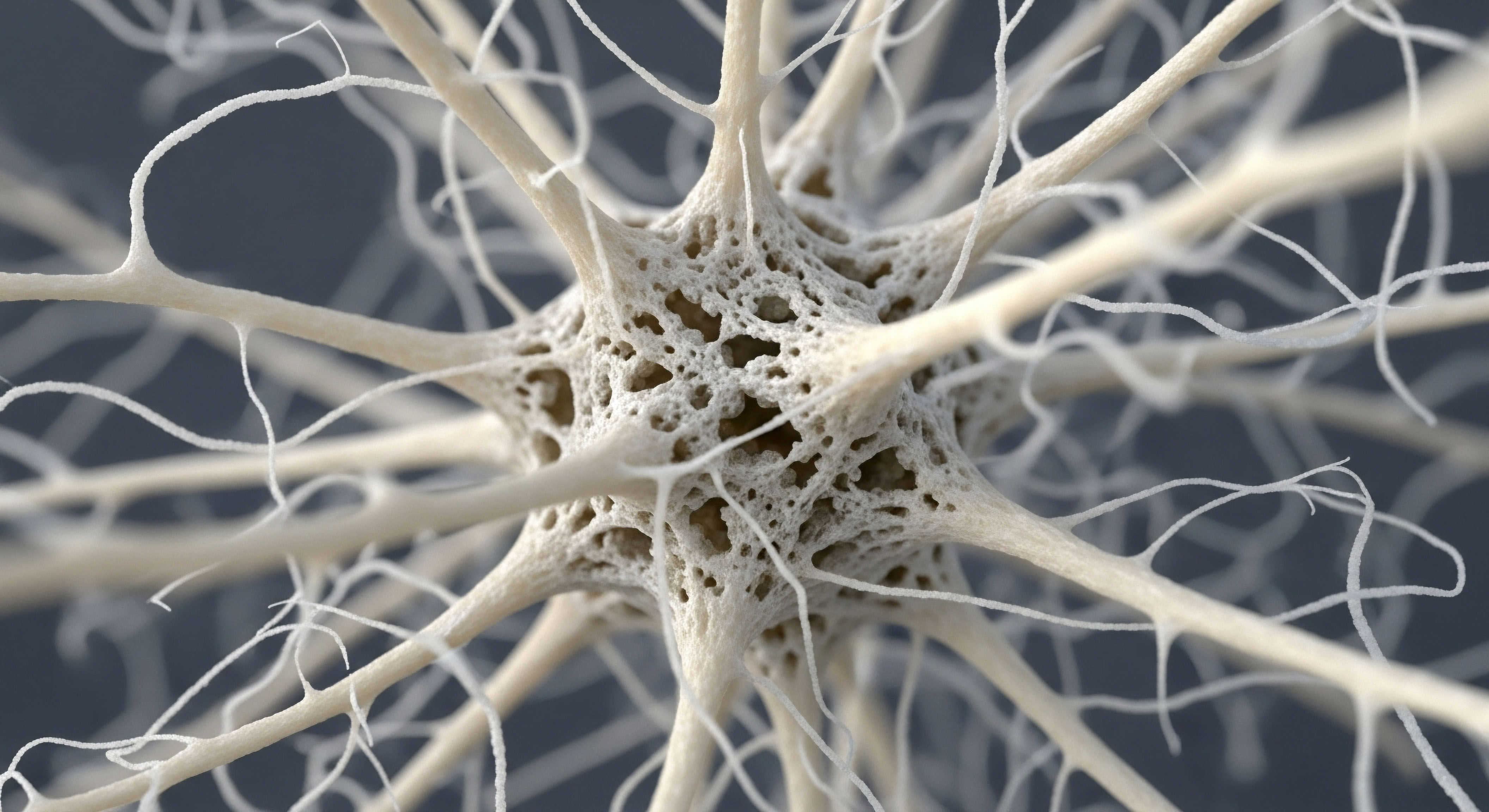

Fundamentals

From Brain Fog to Mental Clarity
That feeling of forgetting a word mid-sentence, the mental fatigue that settles in long before the day is over, or the frustrating sense that your mind is not as sharp as it once was ∞ these are not personal failings. These experiences are often the direct result of shifts within your body’s intricate communication network, the endocrine system.
The hormones this system produces are chemical messengers that regulate nearly every bodily function, including the speed and clarity of your thoughts. When these messenger levels decline or become imbalanced, the cognitive consequences can be deeply unsettling, affecting your confidence, productivity, and overall sense of self.
Understanding the connection between your hormones and your brain is the first step toward reclaiming your cognitive vitality. Your brain is a profoundly active organ, rich with receptors that are specifically designed to dock with hormones like testosterone, estrogen, and growth hormone.
These molecules are not just involved in reproduction or muscle growth; they are fundamental to neuronal health. They protect brain cells from damage, support the growth of new neural connections, and modulate the neurotransmitters that govern mood and focus. When hormonal signals fade, the support structure for optimal brain function begins to weaken, leading to the very symptoms that can disrupt your daily life.

The Neurobiology of Hormonal Decline
The brain does not exist in isolation from the rest of the body. It is in constant dialogue with the endocrine system through complex feedback loops, most notably the Hypothalamic-Pituitary-Gonadal (HPG) axis for sex hormones and the Hypothalamic-Pituitary-Somatotropic (HPS) axis for growth hormone.
Think of these as control systems. The hypothalamus in the brain sends a signal to the pituitary gland, which in turn tells the gonads (testes or ovaries) or other tissues to produce their respective hormones. As we age, the sensitivity and output of this system naturally decline.
This reduction in hormonal signaling has direct physical consequences within the brain. For instance, estrogen plays a significant part in cerebral blood flow and glucose utilization, which is the brain’s primary fuel. Testosterone has been shown to have neuroprotective properties, helping to shield neurons from oxidative stress and cellular damage.
Growth hormone and its downstream signal, Insulin-like Growth Factor 1 (IGF-1), are critical for neurogenesis (the creation of new neurons) and synaptic plasticity, the very basis of learning and memory. A decline in these hormones means less fuel, less protection, and reduced capacity for repair and adaptation within the brain.
A reduction in key hormonal signals directly impacts the brain’s ability to fuel itself, protect its cells, and form new memories.
Hormonal optimization protocols are designed to restore these vital chemical messengers to levels associated with youthful function and health. The goal is not to create unnaturally high levels, but to replenish the supply in a way that allows the body’s systems, including the brain, to operate efficiently once more. By re-establishing these foundational signals, the brain’s cellular machinery can regain its ability to maintain focus, process information, and store memories effectively.


Intermediate

Protocols for Cognitive Recalibration
Moving from the “what” to the “how,” specific hormonal optimization protocols are tailored to address the unique biochemical needs of men and women, with the shared objective of enhancing cognitive function alongside physical well-being. These are not one-size-fits-all solutions but are based on detailed lab work and symptom analysis. The long-term cognitive benefits are a direct consequence of restoring the brain’s exposure to the hormones it requires for optimal performance.
For men experiencing the cognitive slowdown associated with andropause, the primary intervention is often Testosterone Replacement Therapy (TRT). While research shows mixed results for global cognition, some studies indicate improvements in specific domains like verbal and spatial memory. A standard protocol may involve weekly intramuscular injections of Testosterone Cypionate.
This is frequently paired with other medications to maintain systemic balance. For example, Gonadorelin may be used to preserve the body’s own testosterone production signals from the pituitary, while an aromatase inhibitor like Anastrozole is used to control the conversion of testosterone to estrogen, preventing potential side effects and maintaining a favorable hormonal ratio for cognitive health.

Hormone Therapies for Men and Women
The approach for women navigating perimenopause and postmenopause is different, focusing on the interplay between estrogen, progesterone, and sometimes testosterone. The KEEPS Continuation study, a significant long-term analysis, provided reassurance that hormone therapy initiated in early menopause does not cause long-term cognitive harm, though it also did not demonstrate a preventative effect against decline. The clinical focus is on symptom relief, which indirectly supports cognitive function. Protocols may include:
- Transdermal Estradiol ∞ Often delivered via a patch, this method provides a steady, physiologic dose of estrogen, which is vital for cerebral blood flow and neuronal health.
- Micronized Progesterone ∞ Used cyclically or daily, progesterone has calming effects on the nervous system and helps balance the effects of estrogen.
- Low-Dose Testosterone ∞ A small amount of testosterone can be highly effective for women in improving mental clarity, focus, and energy, addressing cognitive symptoms that estrogen and progesterone alone may not resolve.

What Are the Mechanisms of Peptide Therapy in the Brain?
A highly targeted approach for cognitive enhancement involves the use of Growth Hormone Peptides. These are not growth hormone itself, but signaling molecules called secretagogues that stimulate the pituitary gland to produce and release the body’s own growth hormone. This method is considered more physiologic than direct GH administration. Peptides like Sermorelin, Ipamorelin, and Tesamorelin are central to these protocols.
Research in this area is particularly promising. Studies have shown that GHRH administration can improve measures of fluid intelligence, including working memory, planning, and processing speed. Tesamorelin, for instance, has been shown to provide cognitive benefits in both healthy older adults and those with mild cognitive impairment. These peptides work by increasing both GH and the subsequent release of IGF-1, which has potent neuroprotective and neuro-regenerative effects. The table below compares the primary focus of different hormonal interventions.
| Intervention Type | Primary Hormone(s) Targeted | Primary Mechanism for Cognitive Benefit | Typical User Profile |
|---|---|---|---|
| Male TRT | Testosterone | Neuroprotection, improved dopamine modulation, potential enhancement of spatial and verbal memory. | Men with symptomatic low testosterone (andropause). |
| Female HT | Estrogen, Progesterone, Testosterone | Improved cerebral blood flow, glucose utilization, and neuro-inflammation reduction. Alleviates symptoms that impair cognition. | Perimenopausal and postmenopausal women. |
| Peptide Therapy | Growth Hormone (via secretagogues) | Increased IGF-1, promotion of neurogenesis and synaptic plasticity, modulation of neurotransmitters like GABA. | Adults seeking anti-aging, cognitive, and metabolic benefits. |
These protocols are not mutually exclusive. For example, a man on TRT might also use peptide therapy to further support cognitive and metabolic health. The selection and combination of therapies are a clinical decision based on a comprehensive evaluation of the individual’s hormonal landscape and health goals.


Academic

Neurotransmitter Modulation and Synaptic Plasticity
At a deeper biological level, the long-term cognitive benefits of hormonal optimization are rooted in the modulation of neurotransmitter systems and the enhancement of synaptic plasticity. The brain’s cognitive machinery relies on a delicate balance of excitatory and inhibitory signals. Hormones and peptides act as master regulators of this balance.
For instance, GHRH administration has been demonstrated to increase brain levels of gamma-aminobutyric acid (GABA), the primary inhibitory neurotransmitter in the central nervous system. An increase in GABAergic tone can reduce neuronal excitotoxicity ∞ a state of excessive stimulation that leads to cell damage ∞ and improve cognitive control by filtering out irrelevant stimuli, thereby enhancing focus and executive function.
Simultaneously, these protocols influence brain-derived neurotrophic factor (BDNF), a protein that is fundamental for the survival of existing neurons and the growth of new ones. Both testosterone and estrogen have been shown to upregulate BDNF expression in key brain regions like the hippocampus and prefrontal cortex, areas indispensable for memory formation and complex thought.
This upregulation supports synaptic plasticity, the ability of synapses to strengthen or weaken over time, which is the cellular basis of learning and memory. By restoring hormonal levels, these therapies effectively provide the raw materials needed to maintain and remodel the brain’s physical architecture.

How Does Hormone Therapy Impact Neuro-Inflammation?
Chronic, low-grade inflammation in the brain, or neuro-inflammation, is a key driver of age-related cognitive decline and a hallmark of neurodegenerative diseases. Microglia, the brain’s resident immune cells, can become overactive with age and in states of hormonal deficiency, releasing inflammatory cytokines that impair neuronal function. Hormonal optimization protocols exert a powerful anti-inflammatory effect within the central nervous system.
Estrogen, for example, is known to suppress the activation of pro-inflammatory pathways in the brain. Testosterone has also been shown to have anti-inflammatory properties. Furthermore, some research suggests that peptides may modulate the inflammatory response. This reduction in the brain’s inflammatory background noise is a critical mechanism through which hormonal therapies can preserve long-term cognitive health.
By quieting the chronic immune response, these protocols help protect neurons from collateral damage and create a more favorable environment for cognitive processes.
Hormonal optimization protocols support long-term brain health by rebalancing neurotransmitter systems and reducing chronic neuro-inflammation.
The table below outlines the specific cellular and molecular impacts of key hormones on brain health, providing a mechanistic basis for the observed cognitive benefits.
| Hormone/Peptide | Key Brain Region(s) Affected | Molecular/Cellular Impact | Resulting Cognitive Function |
|---|---|---|---|
| Testosterone | Hippocampus, Amygdala, Prefrontal Cortex | Upregulates BDNF; reduces beta-amyloid accumulation; modulates dopamine pathways. | Improved spatial memory, executive function, mood regulation. |
| Estrogen | Hippocampus, Prefrontal Cortex | Enhances glucose transport; promotes synaptogenesis; reduces oxidative stress and inflammation. | Improved verbal memory, processing speed, and attention. |
| GHRH/IGF-1 | Widespread, including Frontal and Parietal Lobes | Increases GABA levels; promotes neurogenesis; enhances synaptic plasticity; reduces myo-inositol. | Enhanced fluid intelligence, working memory, and cognitive control. |

The Critical Role of the Blood-Brain Barrier
The integrity of the blood-brain barrier (BBB), a highly selective semipermeable border that separates circulating blood from the brain’s extracellular fluid, is another area of influence. The BBB’s function can degrade with age, becoming more permeable and allowing harmful substances to enter the brain, contributing to inflammation and cognitive decline.
There is evidence to suggest that sex hormones, particularly estrogen, play a part in maintaining the tightness and function of the BBB. By supporting the structural integrity of this critical barrier, hormonal therapies add another layer of long-term neuroprotection, safeguarding the brain’s privileged environment and preserving its functional capacity over the lifespan.

References
- Janjgava, Shota, et al. “Age-Related Male Hypogonadism and Cognitive Impairment in the Elderly ∞ Focus on the Effects of Testosterone Replacement Therapy on Cognition.” Journal of Clinical Medicine, vol. 10, no. 16, 2021, p. 3585.
- Smith, Kejal, et al. “Long-term cognitive effects of menopausal hormone therapy ∞ Findings from the KEEPS Continuation Study.” PLOS Medicine, vol. 21, no. 3, 2024, e1004366.
- Baker, Laura D. et al. “Growth Hormone ∞ Releasing Hormone Effects on Brain γ-Aminobutyric Acid Levels in Mild Cognitive Impairment and Healthy Aging.” JAMA Neurology, vol. 73, no. 1, 2016, pp. 89-97.
- Lighthall, Nichole R. et al. “Growth hormone-releasing hormone reverses age-related declines in executive function.” Psychology and Aging, vol. 29, no. 3, 2014, pp. 505-515.
- Grön, Georg, et al. “Testosterone, memory, and the brain.” The Journal of Clinical Endocrinology & Metabolism, vol. 93, no. 10, 2008, pp. 3850-3855.
- Brann, Darrell W. et al. “Estrogen and the brain ∞ mechanisms of action and clinical implications.” Trends in Endocrinology & Metabolism, vol. 18, no. 4, 2007, pp. 155-161.

Reflection

Charting Your Own Biological Course
The information presented here offers a map of the intricate biological landscape connecting your hormonal status to your cognitive function. It details the pathways, the mechanisms, and the clinical strategies that can be used to support and restore the brain’s vitality.
This knowledge serves as a powerful tool, shifting the perspective from one of passive acceptance of age-related changes to one of proactive management. Your personal experience of your own cognitive state is the most important data point you possess. The next step is to consider how this scientific framework aligns with your own life’s story and health objectives.
Understanding your body’s internal communication system is the foundation upon which a truly personalized wellness strategy can be built, allowing you to steer your health journey with intention and precision.



